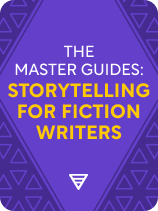

This article is an excerpt from the Shortform book guide to "The Master Guides: Storytelling for Fiction Writers" by Shortform. Shortform has the world's best summaries and analyses of books you should be reading.
Like this article? Sign up for a free trial here.
Why do people read fiction? What do audiences want writers to give them?
If you’re a writer of fiction or an aspiring story writer, it’s important that you know what readers are looking for when they pick up a story to read. They want to feel something, and they want to understand life better.
Continue reading to learn about these two elements that fiction readers hope to find in each story.
Why Do People Read Fiction?
Why do people read fiction? According to story writing experts, audiences want two things when they read a story: an emotional impact and a truth about life. Let’s unpack both desires.
Desire #1: Emotional Impact
First, experts agree that a good story appeals to the audience’s emotions. Audiences love emotional stories because they feel more compelling at the moment and remain more memorable later on.
You don’t need to be a master storyteller to stir an audience’s emotions—humans naturally engage with stories on an emotional level. In Unleash the Power of Storytelling, communication coach Rob Biesenbach notes that listening to a story activates the same regions of the brain as personally experiencing the events described in the story. In other words, when we hear a story, we feel like it’s happening to us.
Desire #2: Truth About Life
Second, many experts agree that people use stories to find meaning—truth about the world that influences how we live our lives. In Story, screenwriting teacher Robert McKee contends that when we encounter new meaning, it’s an intense, emotionally satisfying experience. Our craving for this experience motivates us to seek stories.
In On Writing, author Stephen King concurs that good writing pulls the audience in by telling the truth. If your characters seem real and behave in recognizable ways, the audience will see themselves and their beliefs embedded in the story. If they can’t identify with any of the characters and find them implausible, they’ll likely disengage.
According to McKee, this doesn’t mean that good stories have to be something that could realistically occur—rather, every detail in a good story reflects life as it truly is. For example, even though Pixar’s Finding Nemo is about a talking clownfish, it’s true to life because it reflects how a father traumatized by the death of his wife would truly react if his son were kidnapped. If Nemo’s father, Marlin, had laughed about losing his son (perhaps a screenwriter’s attempt at a joke), the story would no longer be true to life.

———End of Preview———
Like what you just read? Read the rest of the world's best book summary and analysis of Shortform's "The Master Guides: Storytelling for Fiction Writers" at Shortform.
Here's what you'll find in our full The Master Guides: Storytelling for Fiction Writers summary:
- How to capture and communicate emotional magic through fiction
- Advice from successful authors and storytelling experts
- The five steps of writing a story, from ideating to publishing






